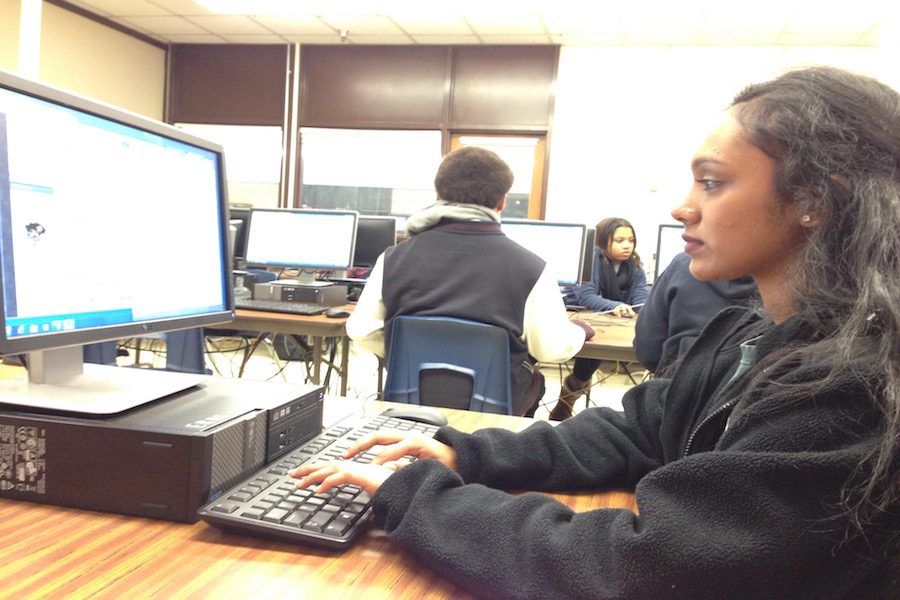How-To Guide: How To Survive RP
Senior Sheetal George working on her RP project in the computer lab.
December 21, 2016
For every student in the Science and Technology program, there is one stepping stone waiting for them at the end of the road before he or she is able to graduate: Research Practicum (RP). Once accepted into the S/T program, many underclassmen are given very little information regarding what RP is, or how rigorous and time consuming the course can be. Senior Anders Croft had that experience, explaining that he had very little knowledge of what RP truly was. “I knew that it was some sort of research project,” said Croft. “I knew that all the seniors put in a lot of work for it, and I heard somewhere that it was a 100-paged thesis paper. But that’s about it. I was pretty scared.”
I also had little to no information about what RP was. Going into my freshman year of high school, I pushed away the thought of RP until the end of my junior year, when I was confronted with the predicament of coming up with a project. Even then, so many questions filled my head: How would I go about executing my project? How was I supposed to come up with a year-long project and write a paper about it? How is one able to do all this, while managing six other classes? This article serves as a guide for underclassmen who have questions about RP, and want to prepare for their chaotic (and it will be chaotic, trust me) senior year.
Along with fulfilling the requirements of 10 credits in core classes and 3 credits in advanced S/T courses, a student must be able to conduct a year-long research project in the areas of Biology, Engineering, Computer Science, Physical Science, WISP, or Forestry. Students have the opportunity to intern at a research facility with a scientist to aid in the scientist’s research, and design their own experiment. If not, the student’s RP teacher will serve as their coordinator and guide them through the process. The first step is picking a project. If you’re going into your senior year, you will have already picked an area of focus. If you’re confused about what to do, you can find projects that fall into your focus area online, or talk to your RP teacher about possible project ideas. But when you do find a project, get started on it as soon as possible. I cannot stress this enough! If you can, prepare your project proposal before your junior year ends, and start your project during the summertime. If you’re able to collect your data during the summer, that saves you the hassle of collecting data during the school year, which can interfere with schoolwork, applying to colleges and scholarships, sports, etc. Senior Anderson Urias Orellana agrees with this, stating that students should “start RP during the summer, before that if possible.”
“It will make your life so much easier,” said Orellana.
Once students have picked a project that has been approved, they can begin research on their topics, and start writing their five-chapter paper. Each chapter has guidelines that need to be followed, and each chapter is reviewed by one’s RP teacher. However, different chapters require different information. Chapter 2, specifically, requires an overview of all the research a student has done on the experiment, and a summary of different studies that pertain to your experiment. Each week, an RP teacher will assign annotated bibliographies, which are format-specific summaries of published journals or papers written by accredited scientists. The real challenge here is annotating the bibliographies by the time they’re due. Each published paper could vary in length from a couple pages to several pages long, making some time-consuming to annotate. That’s why it’s important to manage your time accordingly. Many teachers assign multiple annotated bibliographies each week, so don’t wait till the last minute! Start from the beginning of the week and work efficiently. Be careful when annotating though–copy and pasting information from your sources onto your annotated bibliography is plagiarism, and if you use that source when it comes time to write your chapter 2, well, you’re in for a boatload of trouble. Instead, read and write everything in your own words. This will pay off in the long run.
Even through the various difficult and time-consuming assignments that are given in RP, there is essentially only one way of being successful in RP: Having excellent time management skills. There is always a deadline coming up, and waiting until the last minute to finish your assignments is a good way to set yourself up for failure (and lose sleep in the process).
“Learn to manage your time wisely and be organized,” said senior Kelly Graninger. “Don’t wait until midnight the night before it’s due. Sure you’ll get it done, but you’ll be so stressed, and you want to make senior year as stress-free as possible, especially because you’ll be trying to manage college apps at the same time for the first few months. Just try to get as ahead as you possibly can. Also, don’t hesitate to ask your teacher for help with something. They’re there to help you and make sure you do well.”
RP can be a rewarding learning experience that can better prepare students for college, if one puts in an adequate amount of effort to organize their time. The skills learned in RP can be utilized in the future, making RP essential to a student’s success.





